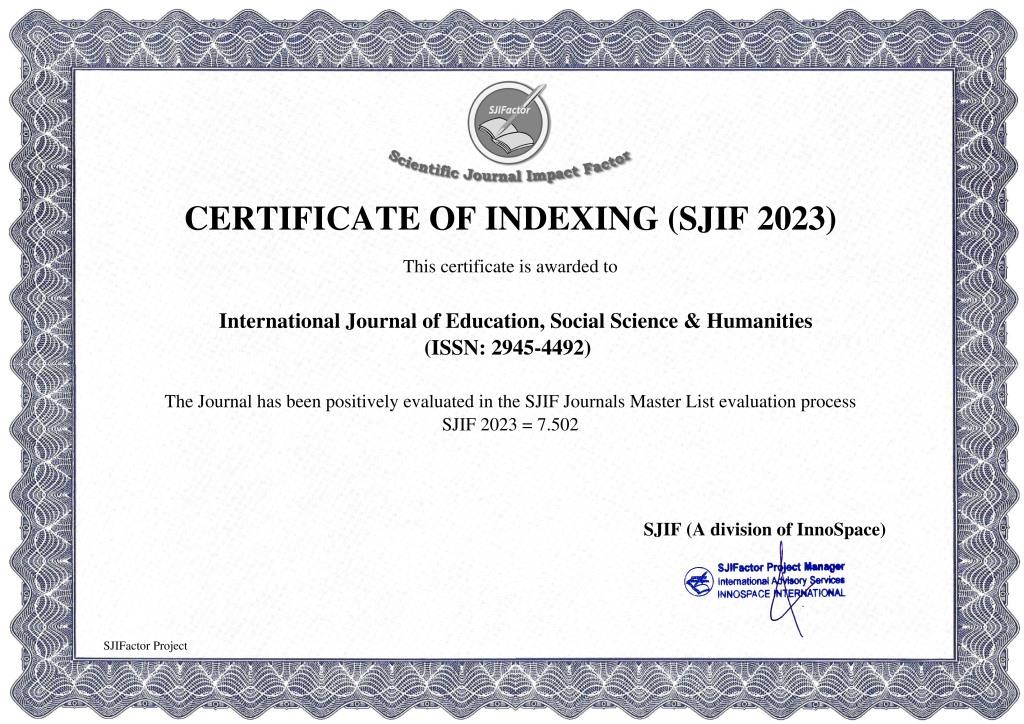THE CHALLENGES IN THE PROTECTION OF THE RIGHTS AND INTERESTS OF CITIZENS BY A CONSULAR INSTITUTION
Keywords:
Consular institution, Citizen rights, Citizen interests, Legal complexities, Jurisdictional boundaries, Language barriers, Cultural barriersAbstract
Consular institutions play an essential role in protecting the rights and interests of citizens who reside or travel abroad. However, they encounter numerous obstacles in fulfilling this responsibility effectively. This abstract examines the primary obstacles consular institutions face in protecting the rights and interests of citizens. Challenges include limited resources, navigating legal and jurisdictional complexities, overcoming language and cultural barriers, ensuring consular access and cooperation, managing emergency response and crisis situations, protecting vulnerable groups, addressing cybersecurity and data privacy concerns, and increasing public outreach and awareness. To effectively address these challenges, collaboration with relevant stakeholders, investments in technology and infrastructure, diplomatic negotiations, staff training, and close cooperation with local communities and international partners are required. In an increasingly complex global landscape, consular institutions can strengthen their ability to safeguard the rights and interests of citizens by understanding and addressing these challenges comprehensively.
References
nternational legal acts:
Vienna Convention on Consular Relation of 1963
II. Books and Articles:
Cooper, A., Heine, J., & Thakur, R. (Eds.) (2013). The Oxford handbook of modern diplomacy. Oxford: Oxford University Press
Gafurova, Sevara, Coherence of the Consular Protection Institution with Other Legal Branches and Institutions of International Law (January 12, 2020). TJL - Tematics journal of Law 2020 ISSN 2249-9806, Available at SSRN: https://ssrn.com/abstract=3771344
Martin and Christian Tams. “The Right to Consular Assistance Under International Law: The LaGrand Case Before the International Court of Justice.” German Yearbook of International Law 42 (1999): 192-241.
Sepúlveda-Amor, Bernardo, 'Diplomatic and Consular Protection: the Rights of the State and the Rights of the Individual in the LaGrand and Avena Cases', in Ulrich Fastenrath and others (eds), From Bilateralism to Community Interest: Essays in Honour of Bruno Simma (Oxford, 2011; online edn, Oxford Academic, 1 May 2011), https://doi.org/10.1093/acprof:oso/9780199588817.003.0068,
Kolesnikov, Yuri A. “Meddling with the Vienna Convention on Consular Relations: The Dilemma and Proposed Statutory Solutions.” McGeorge Law Review 40 (2009): 180-225.
Dewi Avilia Cоnsular assistance for nationals detained by a foreign government: states’ policies and practises Indonesia Law Review (2017) 1113 – 134
Coates, P. D. (1988).The China consuls: British consular officers, 1843–1943. Hong Kong: Oxford University Press
Guillaume, X. (2019). The duty of care and deterritorialized citizenship: From governing citizenship to acts of cit-izenship. In N. Graeger, & H. Leira (Eds.),The duty of care in international relations: Protecting citizens beyond the border(1st ed., pp. 105–117). London and New York: Routledge
Melissen, J. Consular diplomacy's first challenge: Communicating assistance to nationals abroad. Asia Pac Policy Stud. 2020; 7: 217– 228. https://doi.org/10.1002/app5.298
Löwenheim, O. (2007). The responsibility to responsibilize: Foreign offices and the issuing of travel warnings.International Political Sociology,1(3), 203–221.MELISSEN227
Melissen, J., & Caesar-Gordon, M. (2016). ‘Digital diplomacy’ and the securing of nationals in a citizen-centric world. Global Affairs, 2(3), 321–330. https://doi.org/10.1080/23340460.2016.1239381
Manor, I. (2019). The digitalization of public diplomacy. Cham: Palgrave Macmillan
Maley, W. (2011). Risk, populism, and the evolution of consular responsibilities.
J. Melissen, & M. Fernández (Eds.), Consular affairs and diplomacy (pp. 43–62). Leiden and Boston: Martinus Nijhoff Publishers.














